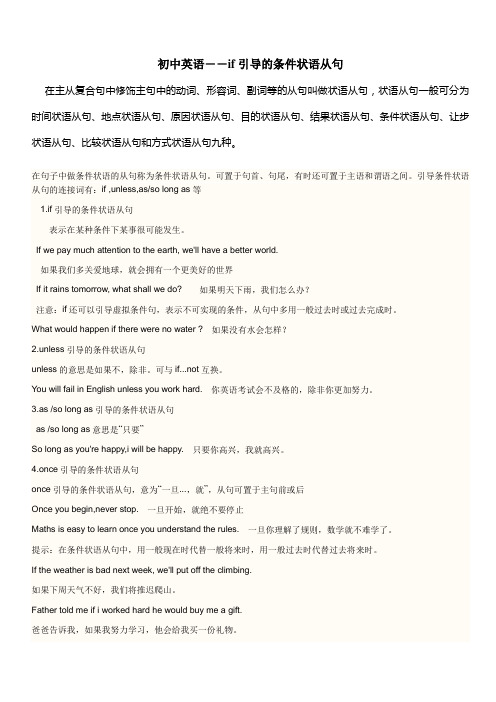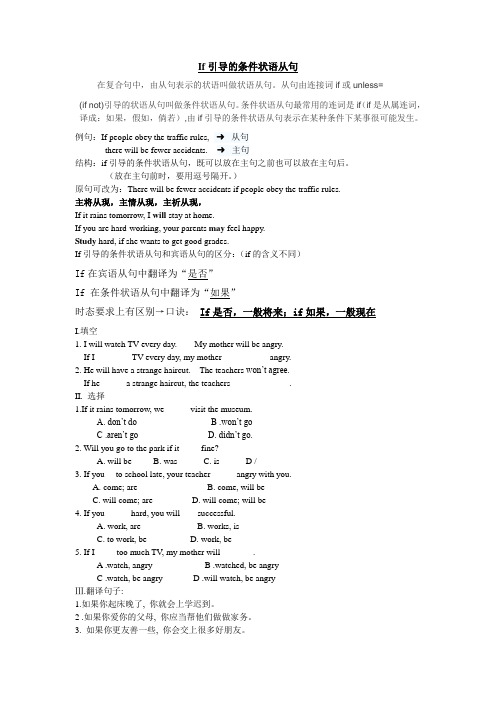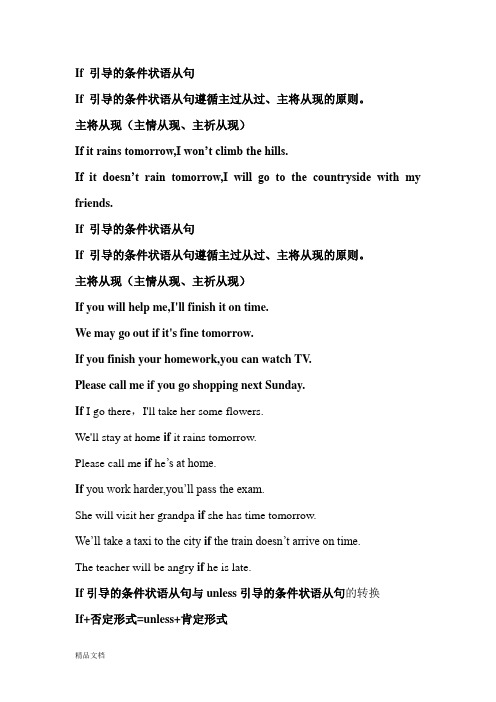If 引导的条件状语从句
if 引导的条件状语从句

一般现在时。 If you drive too fast, you may have an accident. You must stop if the traffic is red. If you finish the homework, you can go home. 如果你作业做完了就可以回家了。 If you want to lose weight you must/should eat less bread. 如果你想减肥,你必须少吃面包。
if引导的条件状语从句
If条件句:条件句用于陈述语气,表示将来的可能性,能力, 允
诺,命令,要求,请求,建议时,假设的情况可能发生,其中 if 是“假如, 如果”的意思。主句一般将来时 ,从句用一般现在时。
运用“主将从现”的原则。
构 成
条件从句
主句
时 态
If+一般现在时 主语+shall/will+动词原形
if引导的条件状语从句
主从句的时态?
If I get up late, I will be late for school. If I don’t finish my homework, I won’t go to bed. If you join the band(乐队), you will be famous.
• 除非天气不好,我每天早晨都要去散步。
• 3. I won‘t loan you unless you are in extreme need of money.
• 若不是你急需用钱,我不会借钱给你的。
if引导的条件状语从句
Summary(小结)
if 条件句不一般, 几个要点记心间; 条件句,放在前, 逗号要放句中间。 条件句表可能, 主将从现不一般; 条件句表事实, 主句常用现在时。
初中英语——If引导的条件状语从句

初中英语――if引导的条件状语从句在主从复合句中修饰主句中的动词、形容词、副词等的从句叫做状语从句,状语从句一般可分为时间状语从句、地点状语从句、原因状语从句、目的状语从句、结果状语从句、条件状语从句、让步状语从句、比较状语从句和方式状语从句九种。
在句子中做条件状语的从句称为条件状语从句。
可置于句首、句尾,有时还可置于主语和谓语之间。
引导条件状语从句的连接词有:if ,unless,as/so long as等1.if引导的条件状语从句表示在某种条件下某事很可能发生。
If we pay much attention to the earth, we'll have a better world.如果我们多关爱地球,就会拥有一个更美好的世界If it rains tomorrow, what shall we do? 如果明天下雨,我们怎么办?注意:if还可以引导虚拟条件句,表示不可实现的条件,从句中多用一般过去时或过去完成时。
What would happen if there were no water ? 如果没有水会怎样?2.unless引导的条件状语从句unless的意思是如果不,除非。
可与if...not互换。
You will fail in English unless you work hard. 你英语考试会不及格的,除非你更加努力。
3.as /so long as引导的条件状语从句as /so long as意思是“只要”So long as you're happy,i will be happy. 只要你高兴,我就高兴。
4.once引导的条件状语从句once引导的条件状语从句,意为“一旦...,就”,从句可置于主句前或后Once you begin,never stop. 一旦开始,就绝不要停止Maths is easy to learn once you understand the rules. 一旦你理解了规则,数学就不难学了。
If引导的条件状语从句

If引导的条件状语从句在复合句中,由从句表示的状语叫做状语从句。
从句由连接词if或unless=(if not)引导的状语从句叫做条件状语从句。
条件状语从句最常用的连词是if(if是从属连词,译成:如果,假如,倘若),由if引导的条件状语从句表示在某种条件下某事很可能发生。
例句:If people obey the traffic rules, ➜从句there will be fewer accidents. ➜主句结构:if引导的条件状语从句,既可以放在主句之前也可以放在主句后。
(放在主句前时,要用逗号隔开。
)原句可改为:There will be fewer accidents if people obey the traffic rules.主将从现,主情从现,主祈从现,If it rains tomorrow, I will stay at home.If you are hard-working, your parents may feel happy.Study hard, if she wants to get good grades.If引导的条件状语从句和宾语从句的区分:(if的含义不同)I.填空1. I will watch TV every day. My mother will be angry.If I ________TV every day, my mother _____ _____angry.2. He will have a strange haircut. The teachers won’t agree.If he _____ a strange haircut, the teachers______ _______.II. 选择1.If it rains tomorrow, we _____ visit the museum.A. don’t do B .won’t goC .aren’t go D. didn’t go.2. Will you go to the park if it ____ fine?A. will beB. wasC. is D /3. If you __to school late, your teacher _____ angry with you.A. come; areB. come, will beC. will come; areD. will come; will be4. If you _____ hard, you will ___ successful.A. work, areB. works, isC. to work, beD. work, be5. If I ____ too much TV, my mother will _______.A .watch, angryB .watched, be angryC .watch, be angryD .will watch, be angryⅢ.翻译句子:1.如果你起床晚了, 你就会上学迟到。
If 引导的条件状语从句

If 引导的条件状语从句1. If you copy my homework this time, you will start a bad habit.2. I’ll ask the teacher for help if I don’t understand.3. If the traffic lights are red, you must stop and wait.4. You can pass the exam if you work hard= Work hard, and you will pass the exam.5. If you don’t hurry up, you will be late again.= Hurry up, or you will be late again.[要点演绎]◆结构:if是从属连词,意为“如果”,用来引导条件状语从句。
if引导的条件状语从句既可放在主句之前,也可放在主句之后。
从句位于主句之前时,常用逗号将其与主句隔开。
如1、3、5。
◆时态:主句用一般将来时(如句1、2)或主句谓语中含情态动词(如must, can, could, should等,如句3、4)时,if引导的条件状语从句用一般现在时表示将来意义。
◆变换:含有if引导的条件状语从句的复合句中,当主句主语和从句主语均为you时,可转换为“祈使句,and + 简单句(如句4)”或“祈使句,or + 简单句(如句5)”。
[学以致用]将下列句子翻译成英语。
1. 如果明天不下雨,我就和同学们去野餐。
2. 如果周日你去购物的话,我就去。
3. 如果你想减肥(lose weight),就锻炼身体吧。
4. 如果冬天来了,春天还会远吗?5. 如果可能的话,我就去火车站接你。
Key:1. If it doesn’t rain tomorrow, I will have a picnic with my classmates.2. I will go shopping on Sunday if you do.3. Take some exercise if you want to lose weight.4. If winter comes, can spring be far behind?5. If (i t is) possible, I’ll meet you at the train station.。
If 引导的条件状语从句

If 引导的条件状语从句If 引导的条件状语从句遵循主过从过、主将从现的原则。
主将从现(主情从现、主祈从现)If it rains tomorrow,I won’t climb the hills.If it doesn’t rain tomorrow,I will go to the countryside with my friends.If 引导的条件状语从句If 引导的条件状语从句遵循主过从过、主将从现的原则。
主将从现(主情从现、主祈从现)If you will help me,I'll finish it on time.We may go out if it's fine tomorrow.If you finish your homework,you can watch TV.Please call me if you go shopping next Sunday.If I go there,I'll take her some flowers.We'll stay at home if it rains tomorrow.Please call me if he’s at home.If you work harder,you’ll pass the exam.She will visit her grandpa if she has time tomorrow.We’ll take a taxi to the city if the train doesn’t arrive on time.The teacher will be angry if he is late.If引导的条件状语从句与unless引导的条件状语从句的转换If+否定形式=unless+肯定形式You won’t pass the exam if you don’t work hard.=You won’t pass the exam unless you work hard.If you don’t go to bed earlier,you will feel tired in the morning.=Unless you go to bed earlier,you will feel tired in the morning.If it doesn’t rain,he will play with me tomorrow.=Unless it rains,he will play with me tomorrow.If she doesn’t come,I’ll go shopping alone=Unless she comes,I’ll go shopping alone.if条件状语从句与祈使句,and/or+一般将来时的句子转化If you get up early,you’ll get there on time.=Get up early,a nd you’ll get there on time.=Get up early,or you won’t get there on time.If you get up early,you won't be late for school.=Get up early,and you won't be late for school.=Get up early,or you will be late for school.If you don’t get up early,you won’t c atch up with the early bus. =Get up early,and you will catch up with the early bus.=Get up early,or you won’t catch up with the early bus.if条件状语从句与without的句子转化If there is no water,we can't live.=We can't live without water.If there is no water,fish will die.=Fish will die without water.If you help me,I’ll finish the work soon.=With your help,I finish the work soon.if条件状语从句与祈使句,and/or+一般将来时的句子转化If you get up early,you’ll get there on time.=Get up early,and you’ll get there on time.=Get up early,o r you won’t get there on time.If you get up early,you won't be late for school.=Get up early,and you won't be late for school.=Get up early,or you will be late for school.If you don’t get up early,you won’t catch up with the early bus.=Get up early,and you will catch up with the early bus.=Get up early,or you won’t catch up with the early bus.1. your friend ,I'll tell you.eB.will comeesD.are coming2. If you go to college,you a good education.A.will getB.getC.getsD.got3.I want to know if they tomorrow.eB.will come C comes D.came4.Take enough exercise, you'll be in good heath.A.orB.soC.butD.and5.If it (not rain),he (play)basketball withme tomorrow.6.If Uncle Lan ______(come),I______(call)you up.7.She must see a dentist if she______(have)a toothache.8.Please wake me up if he______(come)back.9.Hurry up!Or you ______(be)late again.10.If you don’t be quic k,you (be)late.1.We won’t wait for you you can’t arrive on time.A.untilB.whenC.afterD.if2.The children will go to the zoo if it (not rain)this Saturday.3.If she work hard,she be able to go to colleage.A.not,notB.won’t,won’tC.won’t,doesn’tD.dpesn’t,won’t4.If I run every day,I (be)healthier.5.If it (not rain),he (play)with me tomorrow.6.She must see a dentist if she (have)a toothache.7.Study hard,or you (not pass)the test.8.If you (not go)to bed earlier,you will feel tired in the morning.9.If he (be)free tomorrow,he will come to your birthday party.10.We will go to the zoo if it (not snow)tomorrow.11.If it is fine tomorrow,I (go)for a filed trip.。
if 引导的条件状语从句6.27

A. be; have B. is; will have C. will be; will have B 2. If you bring snacks to the party, the teachers ___________. A. take it away B. will take them away C. took away them C 3. I will give the book to him if he _________here next Sunday. A. come B. will come C. comes A 4. I don’t know if he __________here tomorrow. A. will come B. comes C. come
if 引导的条件状语从句
(1) if从句的构成 当我们要表示“如果……”时,就会用到if引导的条 件状语从句。 if引导的条件状语从句表示在某种条 件下某事很可能/不可能发生。它的构成有: • if从句(一般现在时) + 祈使句 • if从句(一般现在时) + 陈述句(将来时)
• If you need help, please call me. • If you want to know more about it, please telephone our teacher. • If it rains tomorrow, we will not go to the zoo. • She will come to see me if she has time.
其中if引导的是一个完整的句子,一定要有主语。
(2) if从句的位置 if引导的条件状语从句既可放在主句之后, 又可放在主句之前(但须用逗号隔开)。 • Print the text if you like it. • If you like the text, print it. • Look at the blackboard if you can’t remember the words. • If you can’t remember the words, look at the blackboard.
If引导的条件状语从句

5. If you __d_o_n_’_t _w_o_rk___(not work ) hard , you _w_o_n_’_t _p_as_s_(not pass) the exam.
6. If she __m__e_n_d_s_(mend) the computer , her father __w_o_n_’t_b_l_am__e_(not blame ).
1.有if引导的条件状语从句的复合句中,当主句和从句的 主语均为you时,可转换为“祈使句,and+简单句”或
“祈使句,or+简单句” You can pass the exam if you work hard. Work hard ----------------,and you will pass the exam.
If you don't hurry up,you will be late again.
or Hurry up,------ you will be late again.
2. 借助介词with 或without来转换。
例如: If you help me, I’ll finish my job soon.
If引导的条件状语从句
潘店镇中学
if引导的条件状语从句
例句:If people obey the traffic rules, →从句 there will be fewer accidents. →主句
if:从属连词,意思是:“如果,假如,倘若”
: 结构
if引导的条件状语从句既可以放在句子前, 也可以放在句子后。
时态:
if引导的条件状语从句, 主句用一般将来时(will),从句用一般现在时。
→主句谓语中也可以含有情态动词, 如:must,can,could,should等
if引导的条件状语从句

◆if引导的条件状语从句条件状语从句是在复合句中作条件状语的句子。
表示假如有从句的动作发生就会有主句的动作发生。
条件状语从句常由从属连词if 引导。
◆if引导的条件状语从句使用须知:一、位臵if引导的条件状语从句,既可放在主句之前也可放在主句之后。
当从句臵于主句之前时,常用逗号与主句隔开。
例如:You will catch the bus if you get up early.=If you get up early, you will ca tch the bus.如果你早起的话,就能赶上公共汽车。
二、时态应遵循主、从句时态呼应的原则。
当主句是一般现在时 (包含祈使句和含情态动词ca n, may, must等的句子),从句也用一般现在时。
例如:You must see the doctor if you ar e ill.如果你生病了,你必须去看医生。
If you want to go skating, wear w armclothes.如果你想去滑冰,穿上暖和点的衣服。
一.选择正确答案。
1. It was raining heavily___we got to Paris.A. whileB. ifC. when D. because2. I don’t know if ___tomorrow.A. it doesn’t rainB. the rain will stopsC. the rains won’t stopD. it won’t rain3 . The volleyball match will be put off if it___.A. will rainB. rainsC. rai nedD. is raining4. Difficulties are nothing if we ___no t afraid of themA. willB. shallC. areD. do5. We ___Beijing tomorrow if it doesn’t rain.真的不掉线吗??、????????????A. are going toB. wouldC. shal lD. will go6. I don’t like to be interrupted if I__ _.A. speakB. will speakC. am speaki ngD. spoke7. If you ___the book you will understa nd the story better.A. will be readingB. have readC. will have readD. read8. If you ___I will go with youA. go toB. wentC. willD. s hould go9. I’ll go to meet you,if I ___free the n.A. would beB. will beC. amD. was10. If you ___to the music, buy a CD.A. will listenB. listenC. li steningD. listened11. He suggested ___ a pinic tomorrow.A. to haveB. havingC. haveD. to having12. Be careful, if you ___want to make mistakes.A. won’tB. don’tC. didn’tD. not13. Work hard if you ___to get a good mark.A.wantedB. wantingC. wantD. will want14. I want to know if you___to the part y tomorrow.I will if I___free.A. will e; amB. e; amC. will e; will beD. e; will b e15. The cat ___him___the hand.A.bit; inB. bited; onC. bit; onD. bited; on16. There is going to ___ a sports meeting next week. If it___ , we’ll have to cancel it..A. be; will rainB. have; w ill rainC. be; rainsD. give; is g oing to rain真的不掉线吗??、????????????17. If he ___, I ___go swimming al one.A. doesn’t e will goB. won’t e; will goC. will e; won’t goD. is ing; d on’t go18. If you ___ a chance to study ina foreign country, just take it.A. gettingB. had gotC. will getD. get19. Frank ___ a film if he’s free ne xt Saturday.A. seeB. sawC. has seen D. will see20. If he ______ exercise, he ___h ealthy.A.not; willB.isn’t; won’t beC.doesn’t; will beD.doesn’t d o; won’t be21.I don't know if he___tomorrow.I f he ___,I'll tell you.A.will e;es B.es;esC.es;will D.is ing;is ing22.If you _____ to the party, you’ll have a great time.A. will goB. wentC. goD. going23. It will be a long time ____ Peter _____ his work. A. since, has finished B. after, finishes C. when, will finis h D. before, finishes.24. What will father _____ us from Ja pan?A. takeB. bringC. carryD. ma ke25. Weifang is famous ______ kites.A. forB. toC. onD. with26. I ____ her the answer if she ___ _me.A. can tell, will askB. will tell, will askC. would tell, askD. will tell, as ks27. – What are you going to do tomor row?--We’ll go to the library tomorrow if it ____.A. isn’t rainB. rainC. won’t rainD. doesn’t rain28.—Do you know when he will e back tomorrow?--Sorry, I don’t know. When he ____ b ack, I’ll tell you.A. esB. will eC. eD. may e真的不掉线吗??、????????????29. What will you do if you _____ to the old folk’s home visit?A. goB. wentC.goingD. will g o30. If I eat ____ food, I’ll be very fat.A. too manyB. many tooC. too mu chD. much too31. I’ll give the book to him if he _ __ here next Sunday.A. will eB. esC. is ingD. c ame32. There ____an English film in our school tomorrow.A. is going to haveB. will haveC. is going to beD. has33. Could you tell us where ____?A. will the next Olympic Games heldB. the next Olympic Games will be hel dC. would the next Olympic Games be he ldD. the next Olympic Games would be he ld34. When my mother returned last nigh t, I ____ a book.A. readB. am readingC. was rea dingD. am going to read35.What ____ you ____ when it began t o rain?A. do, doB. were, doingC. are, do ingD. did, do36. I’ll wake you up when he ____bac k.A. willB. is going to eC. esD.e二.在正确的答案下划一条线。
- 1、下载文档前请自行甄别文档内容的完整性,平台不提供额外的编辑、内容补充、找答案等附加服务。
- 2、"仅部分预览"的文档,不可在线预览部分如存在完整性等问题,可反馈申请退款(可完整预览的文档不适用该条件!)。
- 3、如文档侵犯您的权益,请联系客服反馈,我们会尽快为您处理(人工客服工作时间:9:00-18:30)。
If 引导的条件状语从句
If 引导的条件状语从句遵循主过从过、主将从现的原则。
主将从现(主情从现、主祈从现)
If it rains tomorrow,I won’t climb the hills.
If it doesn’t rain tomorrow,I will go to the countryside with my friends.
If 引导的条件状语从句
If 引导的条件状语从句遵循主过从过、主将从现的原则。
主将从现(主情从现、主祈从现)
If you will help me,I'll finish it on time.
We may go out if it's fine tomorrow.
If you finish your homework,you can watch TV.
Please call me if you go shopping next Sunday.
If I go there,I'll take her some flowers.
We'll stay at home if it rains tomorrow.
Please call me if he’s at home.
If you work harder,you’ll pass the exam.
She will visit her grandpa if she has time tomorrow.
We’ll take a taxi to the city if the train doesn’t arrive on time.
The teacher will be angry if he is late.
If引导的条件状语从句与unless引导的条件状语从句的转换
If+否定形式=unless+肯定形式
You won’t pass the exam if you don’t work hard.
=You won’t pass the exam unless you work hard.
If you don’t go to bed earlier,you will feel tired in the morning.
=Unless you go to bed earlier,you will feel tired in the morning.
If it doesn’t rain,he will play with me tomorrow.
=Unless it rains,he will play with me tomorrow.
If she doesn’t come,I’ll go shopping alone
=Unless she comes,I’ll go shopping alone.
if条件状语从句与祈使句,and/or+一般将来时的句子转化
If you get up early,you’ll get there on time.
=Get up early,a nd you’ll get there on time.
=Get up early,or you won’t get there on time.
If you get up early,you won't be late for school.
=Get up early,and you won't be late for school.
=Get up early,or you will be late for school.
If you don’t get up early,you won’t c atch up with the early bus. =Get up early,and you will catch up with the early bus.
=Get up early,or you won’t catch up with the early bus.
if条件状语从句与without的句子转化
If there is no water,we can't live.
=We can't live without water.
If there is no water,fish will die.
=Fish will die without water.
If you help me,I’ll finish the work soon.
=With your help,I finish the work soon.
if条件状语从句与祈使句,and/or+一般将来时的句子转化
If you get up early,you’ll get there on time.
=Get up early,and you’ll get there on time.
=Get up early,o r you won’t get there on time.
If you get up early,you won't be late for school.
=Get up early,and you won't be late for school.
=Get up early,or you will be late for school.
If you don’t get up early,you won’t catch up with the early bus.
=Get up early,and you will catch up with the early bus.
=Get up early,or you won’t catch up with the early bus.
1. your friend ,I'll tell you.
e
B.will come
es
D.are coming
2. If you go to college,you a good education.
A.will get
B.get
C.gets
D.got
3.I want to know if they tomorrow.
e
B.will come C comes D.came
4.Take enough exercise, you'll be in good heath.
A.or
B.so
C.but
D.and
5.If it (not rain),he (play)basketball with
me tomorrow.
6.If Uncle Lan ______(come),I______(call)you up.
7.She must see a dentist if she______(have)a toothache.
8.Please wake me up if he______(come)back.
9.Hurry up!Or you ______(be)late again.
10.If you don’t be quic k,you (be)late.
1.We won’t wait for you you can’t arrive on time.
A.until
B.when
C.after
D.if
2.The children will go to the zoo if it (not rain)this Saturday.
3.If she work hard,she be able to go to colleage.
A.not,not
B.won’t,won’t
C.won’t,doesn’t
D.dpesn’t,won’t
4.If I run every day,I (be)healthier.
5.If it (not rain),he (play)with me tomorrow.
6.She must see a dentist if she (have)a toothache.
7.Study hard,or you (not pass)the test.
8.If you (not go)to bed earlier,you will feel tired in the morning.
9.If he (be)free tomorrow,he will come to your birthday party.
10.We will go to the zoo if it (not snow)tomorrow.
11.If it is fine tomorrow,I (go)for a filed trip.。
